أسلوب Mayo Clinic
العمل الجماعي
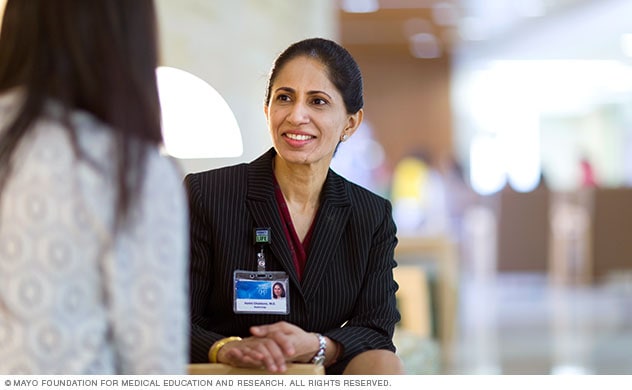 استشارة لزراعة البنكرياس
استشارة لزراعة البنكرياس
استشارة لزراعة البنكرياس في Mayo Clinic (مايو كلينك)
في مايو كلينك، يعمل فريق متكامل من اختصاصيي أمراض الغدد الصماء وجراحة زراعة الأعضاء البطنية والأمراض المُعدية وغيرهم من المتخصصين على تلبية احتياجاتك أنت وعائلتك في جميع مراحل العملية، من التحضير لجراحة زراعة البنكرياس وحتى الرعاية اللاحقة بعد الزراعة.
يعمل الجرّاحون، والأطباء، ومُمرِّضو زرع الأعضاء، والصيادلة، والاختصاصيُّون الاجتماعيون، وغيرهم معًا لإدارة كلِّ جانب من جوانب عملية زرع البنكرياس، بدءًا من التخطيط وحتى الرعاية اللاحِقة للجراحة.
الرعاية المنسقة
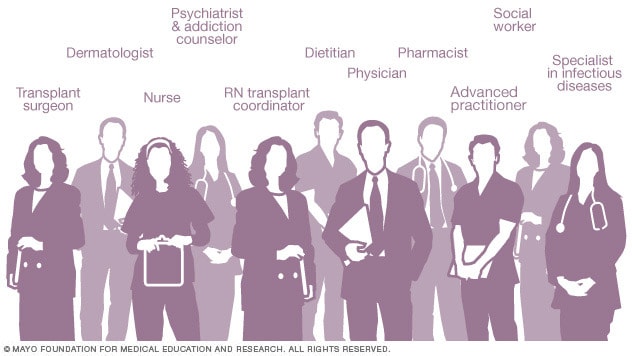 أدوار فريق الرعاية
أدوار فريق الرعاية
اختصاصيو الرعاية الصحية المدرَّبون في العديد من التخصُّصات الطبية يتعاونون كفريق واحد لضمان تحقيق نتائج إيجابية بعد خضوعك لزراعة البنكرياس.
إن اجتماع هذه الخبرات الطبية المتخصصة في مكان واحد يضمن لك رعاية شاملة ومنسقة؛ إذ يناقش الأطباء حالتك معًا، وتُراجَع نتائج فحوصاتك بسرعة، وتُحدَّد مواعيدك بدقة، ليعمل فريق رعاية مرضى الزراعة بأكمله بانسجام على وضع الخطة الأنسب لحالتك.
الخبرة الجراحية
أجرى جرّاحو مايو كلينك المئات من عمليات زراعة البنكرياس الناجحة باستخدام أحدث التقنيات منذ عام 1987.
مايو كلينك من مراكز زراعة الأعضاء القليلة التي تقدم عمليات زراعة البنكرياس لمُرشَحين مختارين من مرضى السكري من النوع الثاني وفيروس نقص المناعة البشري الذي تم علاجه.
ويمكن إجراء جراحة زراعة البنكرياس للأطفال أيضًا في مقر مايو كلينك في مدينة روتشستر بولاية مينيسوتا.
البحث
في مايو كلينك، يمكنك الاستفادة من أحدث العلاجات والأبحاث والتجارب السريرية التي تُقدَّم كجزء من رعايتك الطبية.
ويعمل الباحثون في مركز مايو كلينك لزراعة الأعضاء باستمرار على تطوير تقنيات وأساليب علاجية مبتكرة تهدف إلى جعل عمليات الزرع أكثر أمانًا وفاعلية، وأكثر إتاحةً لعدد أكبر من المرضى.
على سبيل المثال، يعمل الباحثون في مايو كلينك على تطوير بنكرياس اصطناعي يمكن أن يُحدث تحولاً كبيرًا في جودة حياة المصابين بمرض السكري من النوع الأول، وقد يشكِّل بديلاً واعدًا لعمليات زراعة البنكرياس التقليدية.
كما يواصل الباحثون في مايو كلينك جهودهم لاكتشاف طرق تقلل من مخاطر رفض الأعضاء المزروعة، وإيجاد أساليب علاجية مبتكرة للأشخاص الذين يحتاجون إلى عمليات زراعة بمختلف أنواعها.
اقرأ المزيد من المعلومات عن برنامج زراعة البنكرياس في مايو كلينك.
الحد من رفض الأعضاء في عمليات زراعة الأعضاء
شاهد مارك ستيجال (دكتور في الطب)، وريتشارد دالي (دكتور في الطب)، يناقشان تقليل مخاطر الرفض في عمليات زرع الأعضاء.
كان بيت جياناريس مضطرًا إلى التعايش مع روتين غسيل الكلى ثلاث مرات في الأسبوع منذ 12 عامًا.
وبقدر ما يتمتع بيت بالحيوية، فإنه يعترف بأن هذا الأمر يمكنه أن يُضعف أي رجل.
بيت جياناريس:
أنا أعلم ذلك جيدًا.
لقد أثَّر هذا في جسمي.
كان بيت مصابًا بمرض في الكلى معظم حياته.
حتى أنه خضع لعمليات زراعة الكلى من قبل، لكن هذه المرة مختلفة.
حيث قيل له إن جسمه سيرفض بشكل شبه مؤكد أي عضو متبرَع به.
بيت جياناريس:
لا يتفهم كثير من الناس هذا الشعور.
عند إخبارك بأنك بحاجة إلى كلية.
وأنك ستُدرج في قائمة الانتظار.
ثم الحصول على الكلية بعد عامين لتصبح بخير.
هذا ليس ما يمر به الجميع.
مارك ستيغال، دكتور في الطب — جراح زراعة الأعضاء في مايو كلينك:
يمتلك حوالي 80 في المئة من المرضى الذين خضعوا لعملية زرع سابقة أجسامًا مضادة لأنواع أنسجة أخرى.
وربما يكونون قد تعرضوا أيضًا لأنواع أنسجة غريبة عن طريق نقل الدم أو حتى الحمل.
أنيسا سوانيجان:
لقد كنت منهارة
ومصدومة.
لم أكن أتوقع حدوث ذلك أبدًا.
كان الحمل ضربة مزدوجة تعرضت لها أنيسا سوانيجان.
حيث تفاقمت حالة قلبها الضعيف إلى فشل القلب بعد الولادة للمرة الثانية، وأثرت المضاعفات في كبدها بدرجة كبيرة حتى فشل أيضًا.
وأخبرها الأطباء بأنها بحاجة إلى عملية زرع عضوين.
أنيسا سوانيجان:
كان ذلك السبيل الوحيد لنجاتي.
كانت أنيسا تمتلك دافعين أساسيين للنجاة والبقاء على قيد الحياة:
ولداها الصغيران.
لكن المستويات العالية للأجسام المضادة في جسمها جعلتها مرشحة مستبعدة لعملية الزراعة.
تكون الأجسام المضادة مفيدة عندما تساعد على مكافحة الأمراض.
على سبيل المثال، تحفز اللقاحات جهاز المناعة لدينا على تكوين أجسام مضادة.
لكن بالنسبة إلى بعض المرضى الذين ينتظرون الحصول على أعضاء لإنقاذ حياتهم، يقول مارك ستيغال، جراح زراعة الأعضاء والباحث في علم المناعة في مايو كلينك: تتحول الأجسام المضادة إلى عدو.
مارك ستيغال، دكتور في الطب:
إن هذه مشكلة كبيرة.
يوجد حاليًا نحو 9000 شخص مدرجين في قائمة انتظار زراعة الكلى في الولايات المتحدة لديهم أجسام مضادة بمستويات عالية بدرجة كبيرة تمنعهم من الخضوع لعملية الزراعة.
ينتمي بيت إلى الفئة التي يُطلق عليها شديدة الحساسية.
لذا اتبع الدكتور مارك وفريقه مجموعة متنوعة من الخطوات مقدمًا لزيادة فرص النجاح من أجله.
وقد اختاروا بعناية متبرعًا حيًا يوجد في جسم بيت عدد قليل من الأجسام المضادة للعضو الذي سيتبرع به هذا الشخص.
وتوصلت الأبحاث الدوائية إلى طريقة لتقليل معدلات رفض الأعضاء التي تسببها الأجسام المضادة من 40% وصولاً إلى أقل من 10%.
مارك ستيغال، دكتور في الطب:
إحدى تلك الطرق دواء يُسمى "إيكوليزوماب" الذي كنا أول مَن استخدمه.
عندما نعطي هذا الدواء للمريض، فإن الجسم المضاد يرتبط بالكلية، لكنه لا يسبب الضرر.
مر بيت بعدد من مراحل عملية تصفية الأجسام المضادة التي تسمى تبادل البلازما.
بعد ذلك، وبغرض إيقاف إنتاج أجسام مضادة جديدة في نخاعه العظمي، لجأ الدكتور مارك إلى تجربة سريرية في مايو كلينك معتمدة من إدارة الغذاء والدواء الأمريكية باستخدام دواء قوي.
مارك ستيغال، دكتور في الطب:
يسمى هذا الدواء فيلكيد، ويستخدم بالفعل في علاج السرطانات التي تصيب الخلايا التي تفرز الأجسام المضادة.
لكن هذه الخلايا ليست سرطانية بالتأكيد، بل خلايا طبيعية.
خضعت أنيسا أيضًا للعلاج بالأدوية وتبادل البلازما، لكن ظلت مستويات الأجسام المضادة لديها مرتفعة للغاية، وتخوف الأطباء من استمرار رفض جسمها لأعضاء المتبرعين.
ريتشارد دالي، دكتور في الطب — جراح زراعة الأعضاء في مايو كلينك:
كلما مر الوقت على الكبد وهو بهذه الحالة، فإن الأجسام المضادة قد تسبب تلفًا دائمًا في القلب.
لذلك عكسنا العملية وزرعنا الكبد أولاً.
ما السبب؟
يقول المدير الجراحي لقسم زراعة القلب والرئة في مايو كلينك، الدكتور ريتشارد دالي، إن الكبد تعمل على تصفية الأجسام المضادة.
وفي عمليات الزراعة المشتركة للكلية مع الكبد أو القلب مع الكبد، لاحظ فريقه انخفاضًا في الأجسام المضادة لدى المتبرع.
وفي عمليات زرع الأعضاء المتعددة، تجب زراعة القلب أولاً في العادة، لأن أنسجته أكثر حساسية للوقت.
كيف يتغلب فريق مايو على ذلك؟
ريتشارد دالي، دكتور في الطب:
يجب التخطيط للعملية بأكملها،
وإيجاد المتبرع في وقت قريب للغاية.
كما يجب أن ننتهي من عملية تدبير كل المستلزمات، وأن نكون مستعدين تمامًا لتلقي الأعضاء عند وصولها.
أنيسا سوانيجان:
بدا الأمر مبهرًا؛
إذ اجتمع هؤلاء ذوو العقول اللامعة وتعاونوا معًا وتوصلوا إلى طريقة لنجاح العملية.
بيت جياناريس:
لقد انتهزت الفرصة.
لم يكن لديَّ أي شيء آخر لأخسره.
إما أظل متابعًا لروتين غسيل الكلى أو تحدث المعجزة وأحصل على هذه الكلية.
هذه الابتكارات تُحدِث فوارق هائلة في عوالم المرضى كل على حدة.
خبرة Mayo Clinic وقصص المرضى
يخبرنا مرضانا عن أن نوعية تفاعلاتهم واهتمامنا بالتفاصيل وكفاءة زياراتهم تعني الرعاية الصحية مثلما لم يختبروها من قبل. راجع قصص مرضى Mayo Clinic الراضين.
الخبرات والتصنيفات
الخبرة
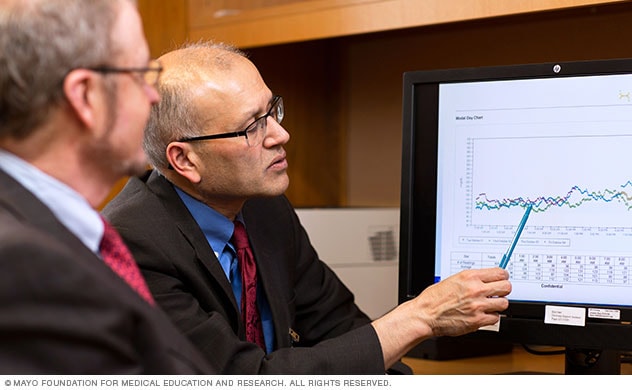 فريق عمل زراعة البنكرياس
فريق عمل زراعة البنكرياس
فريق عمل زراعة البنكرياس في مايو كلينك
توجد لدى مايو كلينك أكبر ممارسات زراعة الأعضاء في الولايات المتحدة. وعبر مواقعها الثلاثة في مينيسوتا وفلوريدا وأريزونا، أجرت مايو كلينك المئات من عمليات زراعة البنكرياس الناجحة. إذ تُجرى عمليات زراعة البنكرياس في مايو كلينك لنحو أربعين شخصًا سنويًا،
مايو كلينك من مراكز زراعة الأعضاء القليلة التي تقدم عمليات زراعة البنكرياس لمُرشَحين مختارين من مرضى السكري من النوع الثاني وفيروس نقص المناعة البشري الذي تم علاجه.
وتتميز نتائج هذه العمليات هناك بأنها تضاهي المعدلات الوطنية بالولايات المتحدة وتتفوق عليها في كثير من الأحيان.
الابتكار والأبحاث
البنكرياس الاصطناعي
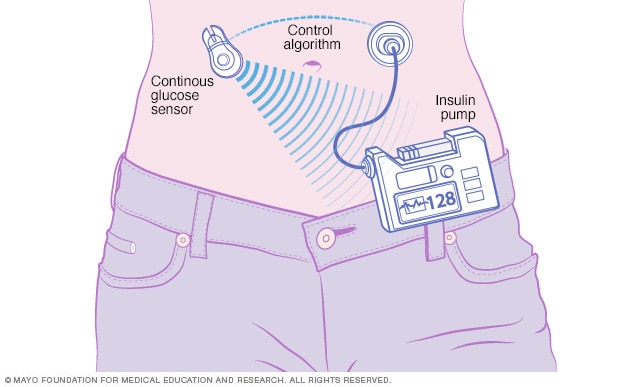
البنكرياس الاصطناعي
رسم توضيحي للبنكرياس الصناعي ناقص النمو في Mayo Clinic (مايو كلينك)
يتميز جرّاحو مايو كلينك بخبرة واسعة في العديد من مجالات زراعة البنكرياس، والتي تتضمن زراعة البنكرياس وحده، وزراعة البنكرياس والكلى معًا، وزراعة البنكرياس بعد الكلى.
يدعم مركز مايو كلينك لزراعة الأعضاء عددًا كبيرًا من الدراسات والأبحاث المتخصصة في زراعة البنكرياس. ويعمل أطباء مايو كلينك بنشاط على استكشاف أحدث تقنيات الزراعة وتحسين خيارات العلاج المتاحة، كما يشاركون نتائج أبحاثهم وخبراتهم في المؤتمرات الوطنية والدولية.
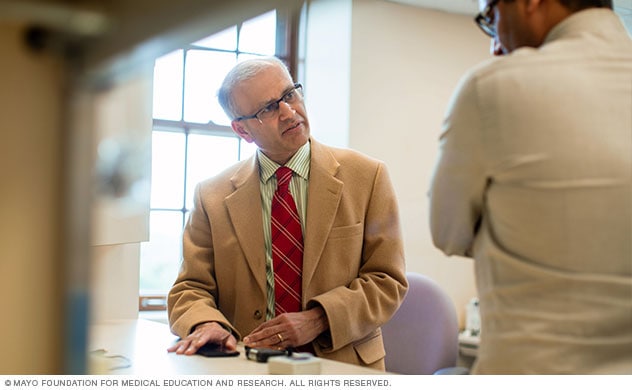 مختبر البنكرياس الاصطناعي
مختبر البنكرياس الاصطناعي
بنكرياس اصطناعي في أحد مختبرات مايو كلينك
على سبيل المثال، يعمل الباحثون في مايو كلينك على تطوير بنكرياس اصطناعي يمكن أن يُحسِّن جودة حياة المصابين بداء السكري من النوع الأول تحسنًا ملحوظًا، وقد يشكِّل بديلاً مستقبليًا لعمليات زراعة البنكرياس.
كما يواصل الباحثون في مايو كلينك جهودهم لاكتشاف طرق تقلل من مخاطر رفض الأعضاء المزروعة، وإيجاد أساليب علاجية مبتكرة للأشخاص الذين يحتاجون إلى عمليات زراعة بمختلف أنواعها.
خبرة معترف بها وطنيًّا
صنّفت شبكة U.S. News & World Report مستشفى مايو كلينك في مدينة روتشستر بولاية مينيسوتا في المرتبة الأولى في علاج مرض السكري من النوع الأول وأمراض الغدد الصماء حسب تصنيفها لأفضل المستشفيات. وصنف تقرير U.S. News & World Report مايو كلينك في مدينتي فينيكس/سكوتسديل بولاية أريزونا ومايو كلينك في مدينة جاكسونفيل بولاية فلوريدا ضمن أفضل المستشفيات لعلاج مرض السكري وأمراض الغدد الصماء.
اقرأ المزيد من المعلومات عن برنامج زراعة البنكرياس في Mayo Clinic.
الأعداد والنتائج
تؤدي خبرة أطباء Mayo Clinic وأساليب فريق العمل المتكاملة إلى تحقيق نتائج ممتازة في زرع الأعضاء تنافس المعدلات الوطنية. وتعمل الفرق مع متلقي عمليات الزرع قبل الجراحة وفي أثنائها وبعدها لضمان أكبر احتمال لتحقيق أفضل النتائج.
يتم الاحتفاظ بالأرقام والإحصائيات بشكل منفصل في مواقع Mayo Clinic الثلاثة. تحظى Mayo Clinic بنتائج ممتازة في مجال زرع الأعضاء، سواء تم تقييم النتائج مجتمعة أو منفصلة.
مجلدات وإحصائيات زرع البنكرياس
المواقع والسفر والسكن
لدى Mayo Clinic مجمعات رئيسية في فينيكس وسكوتسديل في أريزونا؛ وجاكسونفيل في فلوريدا؛ وروتشستر في مينيسوتا. يضم نظام Mayo Clinic الصحي عشرات المواقع في عدة ولايات.
لمزيد من المعلومات حول زيارة Mayo Clinic، اختر أحد المواقع أدناه:
التكاليف والتأمين
لدى Mayo Clinic ممثلون من الخدمات المالية والعاملين في التأمين المتعلق بزراعة الأعضاء، الذين يمكنهم تقديم المساعدة فيما يتعلق بالتأمين والمسائل المالية المتعلقة بزراعة الأعضاء.
تعمل Mayo Clinic بالتعاون مع المئات من شركات التأمين وهي مقدِّمة خدمة شبكية للملايين من الناس. وفي معظم الحالات، لا تشترط Mayo Clinic وجود تحويل من طبيب. حيث إن بعض شركات التأمين تشترط وجود تحويل من طبيب أو يكون لديها شروط إضافية للحصول على بعض خدمات الرعاية الطبية. وتشترط العديد من شركات التأمين حصول المريض على إذن بالموافقة المسبقة قبل تقديم خدمات الزراعة.
اقرأ المزيد عن تكاليف زراعة البنكرياس والتأمين في Mayo Clinic.
التجارب السريرية
استكشِف دراسات مايو كلينك حول الاختبارات والإجراءات المخصصة للوقاية من الحالات الصحية واكتشافها وعلاجها وإدارتها.